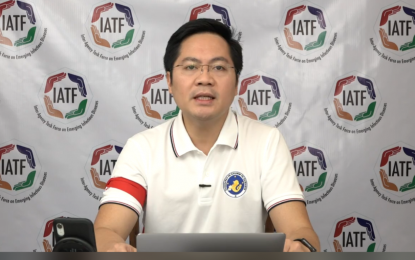
Cabinet Secretary and IATF spokesperson Karlo Nograles
MANILA – The Inter-Agency Task Force for the Management of Emerging Infectious Diseases (IATF-EID) has revised its guidelines on the expanded testing for coronavirus disease (Covid-19) as the country moves closer to the end of the Luzon-wide enhanced community quarantine on April 30.
In a virtual presser on Monday, Cabinet Secretary and IATF spokesperson Karlo Nograles said the expanded testing will only be conducted on individuals who are “at-risk of contracting Covid-19 infection.”
He said those required to undergo testing are “suspect cases, individuals with relevant history of travel and exposure or contact -- whether symptomatic or asymptomatic -- and health workers with possible exposure, whether symptomatic or asymptomatic.”
Indiscriminate testing beyond close contacts of a confirmed Covid-19 case is not recommended, he added.
He also listed subgroups of at-risk individuals arranged in order of greatest to lowest need for testing.
Those who will be prioritized are patients or health workers with severe or critical symptoms, have history of travel or contact with a confirmed Covid-19 case (subgroup A), followed by patients or health workers with mild symptoms, have history of travel or contact with a confirmed Covid-19 case, and are considered vulnerable (subgroup B).
Next in line are patients or health workers with mild symptoms, have history of travel or contact to a confirmed Covid-19 case (subgroup C), and patients or health workers who are asymptomatic but have a history of travel or contact to a confirmed Covid-19 case (subgroup D).
Nograles said due to global shortage of testing kits and limitation in local capacity for testing, the government will rationalize available tests and prioritize subgroups A and B.
However, in view of the expansion of testing capacity and to ensure health workforce safety, subgroup C will be tested and health workers prioritized.
The IATF has directed all subnational laboratories to allocate between 20 to 30 percent of their daily testing capacity for health workers and the remaining 70 to 80 percent for patients, he added.
Type of test kits
Nograles said the real-time polymerase chain reaction (RT-PCR) test approved by the Food and Drug Administration (FDA) and validated by the Research Institute for Tropical Medicine (RITM) is the confirmatory test for Covid-19.
He said rapid antibody-based test kits should not be used as standalone tests to definitively diagnose or rule out Covid-19.
“Because these (rapid antibody-test kits) must be used in conjunction with RT-PCR, care must be exercised to not unduly consume RT-PCR test kits for the sake of confirmation,” he said.
He also emphasized that reporting of confirmed and recovered cases will continue to be based on RT-PCR testing, in accordance with Administrative Order 2020-0013.
“Only rapid antibody-based test kits approved by the FDA and locally-validated by the RITM or the Department of Science and Technology may be used,” he said.
Nograles also reminded that disposal of test kits, including personal protective equipment (PPEs) and other materials used in testing, should adhere to existing guidelines on the management of healthcare wastes.
He said the expanded use of point-of-care rapid antibody-based test kits through validation and sero-epidemiological studies will be explored for subgroup D, as testing all asymptomatic contacts of confirmed cases using RT-PCR is not recommended until there is surplus testing capacity.
“Results of such validation and sero-epidemiological studies shall be submitted to DOH (Department of Health) and to the Health Technology Assessment Council (HTAC) for their review and consideration. This should inform future prospects of financing of DOH and PhilHealth since both agencies may only finance or reimburse Covid-19 test kits that have been positively recommended by the HTAC as required by RA No. 11223,” Nograles said, referring to the Universal Healthcare Act.
Once the FDA-approved antibody-based test kits have been validated by RITM and other designated institutions, Nograles also said only licensed medical doctors may request and administer antibody-based tests.
Returning overseas workers
Nograles said all returning Overseas Filipinos (OFs) which have community-based Covid-19 transmission have to undergo mandatory 14-day quarantine.
OFWs could also be tested using rapid anti-body tests after they enter quarantine facilities and undergo 14-day quarantine.
He said expanded testing in areas with suspected Covid-19 community-based transmission can be performed at the household, purok, and barangay level with a proper sampling methodology in collaboration with the Epidemiology Bureau and local health officials.
Only properly validated antibody testing kits will be allowed to be used, he added.
Pending availability of plaque reduction neutralization test (PRNT) validation by RITM, Nograles said all who intend to conduct their own validation studies are requested to register their studies through [email protected] (including update on status of ethics approval), use the protocol for local validation study for asymptomatic contacts provided (Annex C), and report testing results.
He also reminded that testing of asymptomatic people should be performed with proper safety precautions, including hand hygiene, use of appropriate PPE for conducting the test, respiratory hygiene, waste disposal, and patient care equipment.
All symptomatic patients should be referred for RT-PCR testing and isolated accordingly.
Last Friday, National Task Force (NTF) Covid-19 chief implementer Secretary Carlito Galvez Jr., also presidential peace adviser, said the government is preparing for the procurement of 900,000 RT-PCR test kits and 2 million rapid testing kits.
The government, he said, will purchase the testing kits along with other medical equipment and supplies to capacitate accredited national and sub-national testing laboratories in the country.
The additional PCR and rapid testing kits cost roughly PHP3.2 billion and will be purchased by the procurement service of the Department of Budget and Management.
As of April 19, there are a total of 6,250 confirmed Covid-19 cases in the country, 409 deaths, and 572 recoveries.
President Rodrigo Duterte is expected to decide on whether to extend or modify the ECQ within the week, according to the Malacañang. (PNA)
